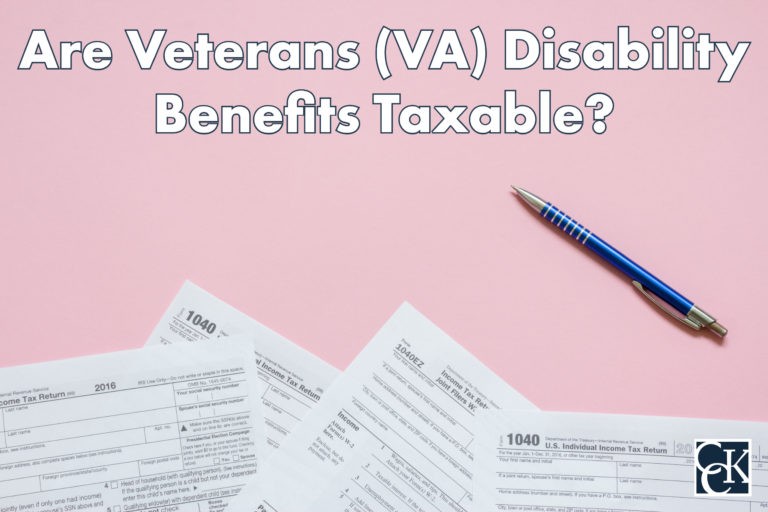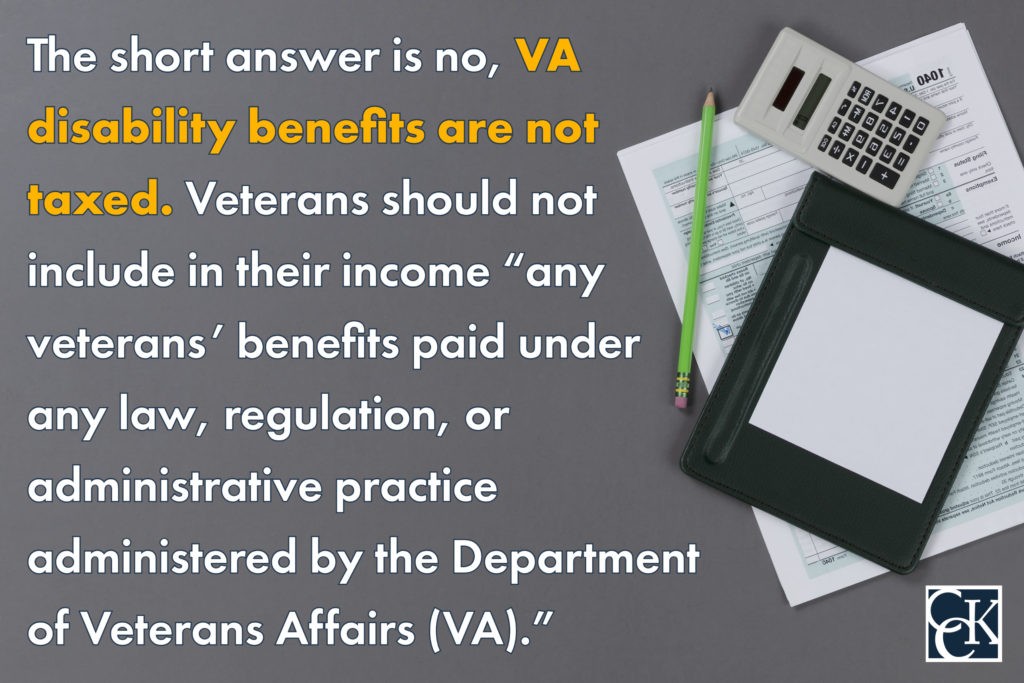Are Veterans (VA) Disability Benefits Taxable?
What Are VA Disability Benefits?
The Department of Veterans Affairs (VA) offers a variety of benefits to eligible U.S. military veterans who are disabled due to their military service. These benefits include – but are not limited to – the following:
- Disability compensation paid to veterans with service-connected disabilities
- Pensions paid to veterans with service-connected disabilities
- Health and dental care benefits for disabled veterans
- Life insurance benefits
- Allowances for education and training (e.g., GI Bill education benefits)
- Benefits to pay for wheelchair-accessible housing
- Automobile allowances or grants for adaptive equipment for vehicles
- Dividend interest on VA-held deposits
- Assistance for dependent care
- Death benefits paid to survivors of military veterans who died after September 11, 2001
- VA compensated work therapy program payments
Is VA Disability Taxed?
The short answer is no, VA disability benefits are not taxed. According to IRS Publication 907, veterans’ disability benefits are not taxable.
As stated in IRS publications, veterans should not include in their income “any veterans’ benefits paid under any law, regulation, or administrative practice administered by the Department of Veterans Affairs (VA).”
In certain circumstances, veterans may have to report some or all benefits to the IRS and pay taxes on them. In this scenario, a qualified Certified Public Accountant (CPA) or tax professional can be helpful in determining any taxes that may need to be paid.
Military Retirement Pay
If a veteran is a military retiree who receives disability benefits that do not come from VA, different rules may apply. For example, military retirement pay is taxable. Veterans who receive pension based on their age or length of service must report this income on their taxes. However, there are certain circumstances where military retirement pay is tax-free.
What if I Receive VA Disability Benefits, but Also Work?
VA disability benefits are still tax-free, even if the veteran is working. Employment does not affect the tax treatment of a veteran’s benefits. So long as VA pays and administers the veteran’s disability benefits, the veteran does not have to pay any VA disability taxes.
It is important to note, however, that the veteran must still pay taxes on their regular income.
Are Veterans Entitled to Other Tax-Free Benefits?
In addition to the disability benefits listed above, veterans and their loved ones may be eligible for the following tax-free benefits:
- Dependency and Indemnity Compensation— This is available to the surviving spouse, child, or parent of a veteran who died from a service-related injury or illness.
- Special Monthly Compensation— This is additional compensation that helps cover certain disabilities such as the loss of sight, loss of a limb, or need for regular aid and attendance due to a service-connected disability.
Is VA Disability Tax-Free After a Rating Increase?
Yes, if a veteran’s VA disability rating increases, their benefits will remain tax-free. Regardless of a veterans’ rating percentage, all VA disability benefits are tax-free.
In addition, veterans who are granted a disability rating increase – which may include a retroactive determination – OR veterans who have been granted Combat-Related Special Compensation after an award for Concurrent Retirement and Disability Pay may be eligible to claim a federal tax refund.
Are Lump Sum Severance Payments Taxed?
Veterans who were discharged from their military service on account of a medical disability may receive a one-time lump sum severance payment from the Department of Defense (DoD).
Under the Combat-Injured Veterans Tax Fairness Act of 2016, veterans cannot be taxed on this lump sum disability severance payment. The DoD will identify veterans who were taxed on this sum to ensure they receive an amended tax return with their refund.
Do VA Disability Benefits Count Toward the Earned Income Tax Credit (EITC)?
The Earned Income Tax Credit (EITC) is a refundable tax credit for low-income Americans that, in some cases, enables them to receive a tax refund exceeding what they paid in taxes throughout the year.
However, even though a veteran ‘earned’ their VA disability benefits through military service and the disability they suffered on behalf of the country, these benefits are not considered earned income and therefore do not count towards the EITC. Military pension also does not count towards the EITC.
It is important to note that VA disability does not reduce or eliminate tax credit for veterans who have other income that qualifies them for the EITC.
(Note: Veterans who are permanently and totally disabled may qualify for the EITC.)
Tax Filing Resources for Veterans
In 2015, VA and the IRS entered into a Memorandum of Understanding. The primary purpose of the partnership was to offer free tax preparation services to veterans and their families. Several organizations joined the partnership to provide tax advice and filing services to veterans with low to moderate incomes.
Below are some examples of these services:
- IRS Free File – The IRS Free File program offers all tax forms for free. As of 2022, if the veteran made less than $72,000 during 2020, they qualify for free software provided by the IRS and leading tax software providers. This program can include free federal and state tax return preparation and electronic filing. Veterans who made more than $72,000 can use the Free File Fillable Forms, which are electronic versions of IRS paper forms for those experienced with tax returns.
- Volunteer Income Tax Assistance (VITA) – VITA helps prepare free tax returns for veterans and offers free electronic filing.
- Tax Counseling for the Elderly (TCE) – While similar to VITA, this resource is primarily for those aged 60 years or older, as it focuses on tax issues unique to seniors.
- Earned Income Tax Credit – As mentioned earlier, many veterans are eligible for the Earned Income Tax Credit, which is a refundable federal income tax credit for workers with low to moderate income. According to the IRS, roughly two million veterans and military households receive the Earned Income Tax Credit.
- Free Financial Coaching for Veterans – The Bureau of Consumer Financial Protection, Officer of Servicemember Affairs offers a Financial Coaching Initiative that assists veterans with their financial goals. The program provides free individualized support services from certified financial coaches.
Have More Questions About VA Disability Benefits and Taxes?
The tax code is known for being complex and hard to understand, and even the sections that seem straightforward can feature loopholes and caveats. Therefore, if you receive various forms of income that have different tax treatments, it is a good idea to speak with a qualified CPA or tax preparer before you file taxes each year.
An accountant can review all your income sources, including VA disability benefits, and determine what is and is not taxable.
Have Questions About Your VA Disability Benefits?
If you have received an unfavorable decision from VA, Chisholm Chisholm & Kilpatrick LTD may be able to help. Contact CCK at 401-239-0174 today for a free case review.
We also offer more information regarding VA benefits on our blog and YouTube channel.
Share this Post

